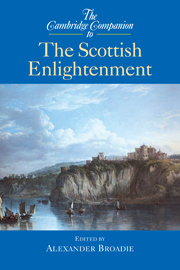Book contents
- Frontmatter
- Introduction
- 1 The contexts of the Scottish Enlightenment
- 2 Religion and rational theology
- 3 The human mind and its powers
- 4 Anthropology: the ‘original’ of human nature
- 5 Science in the Scottish Enlightenment
- 6 Scepticism and common sense
- 7 Moral sense and the foundations of morals
- 8 The political theory of the Scottish Enlightenment
- 9 Economic theory
- 10 Natural jurisprudence and the theory of justice
- 11 Legal theory
- 12 Sociality and socialisation
- 13 Historiography
- 14 Art and aesthetic theory
- 15 The impact on Europe
- 16 The impact on America: Scottish philosophy and the American founding
- 17 The nineteenth-century aftermath
- Select bibliography
- Index
8 - The political theory of the Scottish Enlightenment
Published online by Cambridge University Press: 28 May 2006
- Frontmatter
- Introduction
- 1 The contexts of the Scottish Enlightenment
- 2 Religion and rational theology
- 3 The human mind and its powers
- 4 Anthropology: the ‘original’ of human nature
- 5 Science in the Scottish Enlightenment
- 6 Scepticism and common sense
- 7 Moral sense and the foundations of morals
- 8 The political theory of the Scottish Enlightenment
- 9 Economic theory
- 10 Natural jurisprudence and the theory of justice
- 11 Legal theory
- 12 Sociality and socialisation
- 13 Historiography
- 14 Art and aesthetic theory
- 15 The impact on Europe
- 16 The impact on America: Scottish philosophy and the American founding
- 17 The nineteenth-century aftermath
- Select bibliography
- Index
Summary
Scotland's singular voice within the polyphony of the European Enlightenment has attracted a great deal of debate. As historians attempt to weigh local varieties of Enlightenment, informed by disparate religious, political and cultural settings, against the transnational concerns and cosmopolitan aspirations of 'the' Enlightenment, Scotland posits a remarkable case in point. Scotland's European contexts have often been overlooked; by the same token, its distinct features can only be mapped against the contours of the European Enlightenment. David Hume, Adam Smith, William Robertson, John Millar and Adam Ferguson were subtle disciples of European intellectual traditions, and conversant with a range of Enlightenment cultures. At the same time, their writings convey a powerful sense of Scotland's incomparable position as a kingdom within the British union, set apart by its church and jurisprudence, and by its singular decision to trade sovereignty for empire. Nowhere is this apparent tension more pronounced than in the field of political theory.
POLITICS AND THE SCOTS
Taken as a field of enquiry, politics is a conjuncture of mind-sets responding to contemporary political issues, critical perusals of intellectual traditions and cross-fermentation with other sciences. The balance between these elements may differ according to era and culture; but eighteenth-century Scottish thinkers were able to draw vigorously on all three sources of inspiration. Their political thought was accordingly shaped by three sets of problems: Scotland’s voluntary loss of sovereignty in an age when statehood and statecraft steadily gained importance; the need for a viable modern theory of politics amid clashing idioms of the good life and the good polity; and the tall order set by the natural sciences for standards of certainty, regularity and predictability in the study of human affairs.
- Type
- Chapter
- Information
- The Cambridge Companion to the Scottish Enlightenment , pp. 157 - 177Publisher: Cambridge University PressPrint publication year: 2003
- 7
- Cited by



